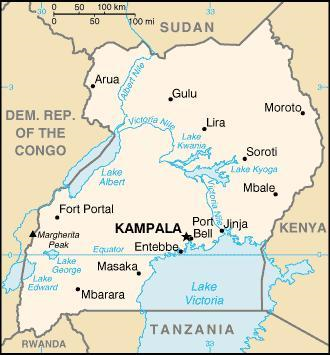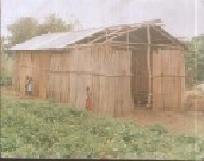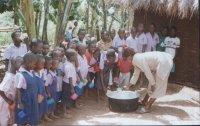BETHEL CHURCH FORTPORTAL
COUNTRY PROFILE

Uganda is situated in eastern Africa, with borders to Kenya, Tanzania, Rwanda, the Democratic Republic of Congo and Sudan, and covers a total area of 236,000 sq. km. Although it is landlocked, Lake Victoria takes up a large part of the total area in the south east. Slightly over 21% of the land is arable, but only slightly less than 9% is given over to permanent crops. As of 2003, a scant 90 sq. km. was irrigated, but the many lakes and rivers mean that it is a fertile, well-watered country.

The nation suffered terribly during the years from 1971 through to 1985, under the dictatorships first of Idi Amin and then of Milton Obote. The attacks carried out by these two, and the guerrilla war which raged during the period, saw the deaths of close to half a million people. The current population of just over 28 million has also been decimated by the affects of the HIV/AIDS virus. This, plus other diseases and poverty, and a high infant mortality rate, has resulted in an average life expectancy of less than 53 years, with a median age of just 15. AIDS also means that many of the children have been left as orphans. Sadly, AIDS orphans are doubly disadvantaged, as many people are so afraid of the disease that they refuse to have anything to do with these children.
Orphan Home

With fertile soil and abundant rainfall, Uganda has a good agricultural industry, producing tea, coffee, corn, cotton, millet, tobacco, cassava (tapioca), potatoes, pulses, cut flowers; beef, goat meat, milk, poultry and sugar. Around 82% of the workforce is employed in agriculture. There are also several industries, including sugar, brewing, tobacco, cotton textiles, cement, and steel production. Coffee makes up most of the exports.
The years of the dictators not only ravaged the population, they also all but destroyed the economy. Since 1986 the government, with considerable foreign aid, has worked hard to stabilise and improve the economy. These measures have included currency reform, improved prices for exports and petroleum, and better public service wages. The aim was to control inflation and to boost production and export earnings, and they are having some measure of success, reflected in steady growth. In spite of this, 35% of the people still live below the poverty line. The telephone system has been assessed as "seriously inadequate" and only about a quarter of the roads are sealed.
In some areas there is still armed fighting between various ethnic groups. Rebel gangs and militias are also active, particularly the "Lord's Resistance Army" which operates in the north of the country. As a result of the activities of the LRA, some Ugandans have fled into southern Sudan or the Democratic Republic of Congo. At the same time, Uganda hosts over 214,000 refugees from Sudan, nearly 19,000 from Rwanda and nearly 15,000 from the D. R. of Congo. There are between 1.3 and 2 million internally displaced persons.
Feeding the Children at School

Uganda is nominally a predominantly Christian country (66% split evenly between Catholic and Protestant), with 16% Muslim and 18% indigenous beliefs. It is difficult to know the number of born-again Christians, but there is an openness to the things of God and a hunger that sees many coming to Christ whenever the Gospel is preached.
